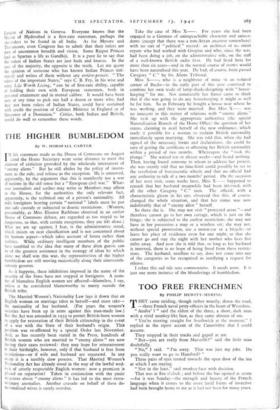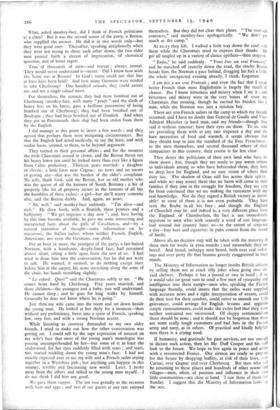TOO FREE FRENCHMEN
By PHILIP HEWITT-MYRING
" You're steering straight for Southwich at the moment," I replied in the ripest accent of the Cannebiere that I could assume.
They stopped in their tracks and gaped at me.
" But—you are really from Marseille?" said the little man doubtfully.
" No," I said. " I'm sorry. That was just my joke. Do you really want to go to Hansford? "
Three pairs of eyes turned towards the open door of the inn at which I am staying.
" Not in the least," said monkey-face with decision.
That was at five o'clock ; and before the bar opened at seven —for it was Sunday—the strength and beauty of the French language when it comes to the more lurid forms of invective had been brought home to me as it had not been for many years. What, asked monkey-face, did I think of French politicians as a class? But it was the second senior of the party, a Breton, who supplied the answer. He did it in two words only—but they were good ones. Thereafter, speaking antiphonally when they were not trying to shout each other down, the two elder men poured forth a stream of imprecation, of rhetorical question, and of bitter regret.
Tens of thousands of men—and retreat ; always retreat. They would never understand it—never. Did I know how wide the Seine was at Rouen? In God's name could not that line at least have been held? And how many Germans were needed to take Cherbourg? One hundred salauds, they could assure me, and not a single salaud more.
For themselves, the seamen, they had been bombed out of Cherbourg (monkey-face, with many "poufs " and the clash of heavy fists on his knees, gave a brilliant pantomime of being bombed out of Cherbourg); they had been bombed out of Boulogne ; they had been bombed out of Dunkirk. And when they got to Portsmouth, their ship had been stolen from them by the English.
I did manage at this point to insert a few words ; and they agreed that perhaps there were mitigating circumstances. But that the English had acted tactlessly, to say the least, and with undue haste, seemed, to them, to be beyond argument.
They turned to their personal affairs ; and for the moment the little Charentais ceased to clown, and the Breton thrust out his heavy lower jaw until he looked more than ever like a figure from Celtic prehistory. Thirteen years married: a daughter of eleven: a little farm near Cognac: no news and no means of getting any—that was the burden of the elder's complaint. No wife, thank God, said the Breton, but an old mother who was the queen of all the knitters of South Brittany ; a bit of property (the bit of property recurs in the laments of all but the humblest of these exiles): a girl—but she'll marry someone else, said the Breton darkly. And, again, no news.
" Ah, well," said monkey-face suddenly. " I'm alive—and rich." He drew forth, with a flourish, three pennies and a halfpenny. " We get sixpence a day now "; and, beer having by this time become available, he gave me some interesting and unexpected facts about the girls of Casablanca, and—by a natural transition of thought—some information on les macaronis, the Italian sailors whom neither French, English, Americans, nor even the Germans, can abide.
For an hour or more, the youngest of the party, a fair-haired Norman, with a handsome, deeply-lined face, had remained almost silent, sitting a little apart from the rest of us. I had tried to draw him into the conversation, but he did not want to talk. He wanted, it seemed, to do nothing except stare before him at the carpet, his arms stretching along the arms of the chair, his hands trembling slightly.
" Le cafard. Quoi?" said the Charentais softly to me. " He comes from hard by Cherbourg. Five years married, and three children—the youngest just a baby, you will understand. He cannot sleep ; and he goes for long walks by himself. Generally he does not know where he is going."
Just then my wife came into the room and sat down beside the young man. He looked at her shyly for a moment—then without any preliminary, burst into a spate of French, speaking low, very fast, and with a strong Norman accent.
While listening as courtesy demanded to my two older friends, I tried to make out how the other conversation was getting on. I could tell by the rapt expression of interest on my wife's face that most of the young man's monologue was passing uncomprehended by her—but some of it at least she understood, for her eyes suddenly filled with tears ; and tears, too, started trickling down the young man's face. I had not exactly expected ever to see my wife and a French sailor crying together in a Westshire pub ; but anything can happen in this strange, terrible and fascinating new world. Later, I broke away from the others and talked to the young man myself. I do not think I did him any good.
We gave them supper. The inn rose grandly to the occasion with ham and eggs ; and two of our guests at any rate enjoyed themselves. But they did not clear their plates. " The stomach contracts," said monkey-face apologetically. " We don't get much at the camp."
At to.15 they left. I walked a little way down the road with them while the Charentais tried to express their thanks He got all tangled up in a variety of choice epithets—then stopped.
"Enfin," he said suddenly. " Vous eles un vrai Francais," and he marched off jauntily down the road, the stocky Breton beside him, the Norman a pace behind, dragging his feet a little; the whole unexpected evening already, I think, forgotten.
I am not a un vrai Francais ; and even the fact that I speak better French than most Englishmen is largely the result of chance. But I know bitterness and misery when I see it ; and bitterness and misery were in the very bones of even my Charentais that evening, though he carried his burden like a man, while the Norman was just a stricken boy.
There are 50o French sailors in the camp to which my friends returned, and I have no doubt that General de Gaulle and Vice- Admiral Muselier (a hard man, said my friends—though they said it without rancour) have their eyes on them. To us, who are providing them with at any rate sixpence a day and the bare necessities of food and warmth, it seems obvious that they should leap to join the standard of the Free Frenchmen ; to the men themselves, and several thousand others of their compatriots in this country, their course is far less clear.
They detest the politicians of their own land who have let them down ; but, though they are ready to pay warm tribute to individuals among us who have befriended them, they have no deep love for England, and no sure vision of where their duty lies. The shadow of Oran still lies across their spirits ; and while we may assure them that no harm will come to their families if they join in the struggle for freedom, they are very far from convinced that we are making the statement with any real knowledge. Nor do they regard a British victory as inevit- able: to some of them it is not even probable. They have seen the Boche in all his fury ; and though the England of Churchill may be, and indeed is, a very different place from the England of Chamberlain, the fact is not immediately apparent to men who, with scarcely a word of our language. loaf around our country lanes or—to the extent of sixpence a day—buy beer and cigarettes in pubs remote from the sound of battle.
Above all, no decisive step will be taken with the majority of these men for 'weeks or even months ; and meanwhile they are bored. And bored, unhappy men brood, both over real suffer- ings and over petty ills that become grossly exaggerated in their minds.
The Ministry of Information no longer insults British citizens by telling them not to crack silly jokes when going into air- raid shelters. Perhaps it has a pound or two in hand ; if so. it would take no great sum to send a few men of sympathy and intelligence into these camps—men who, speaking the French language fluently, could insure that the exiles were supplied with accurate news and a right interpretation of events, could do their best for their comfort, could strive to smooth out little grievances, could arrange for English lessons and organise simple entertainments, could make the exiles feel that they were neither unwanted nor mistrusted. Of sloppy sentimentalism there should be none ; and it should not be forgotten that there are some really tough customers and bad hats in the French army and navy, as in others. Of practical and kindly helpful- ness there is a crying need.
If humanity, and gratitude for past services, are not enough to dictate such action, then let Mr. Duff Cooper and his staff look to the future. We hope to live again in peace and amity with a resurrected France. Our airmen are ready to prer are for this future by dropping leaflets, at risk of their lives, ever Carnac, over Cognac and over Cherbourg. But men who will be returning to these places and hundreds of other towns and villages—men, often, of position and influence in their ovn little communities—are close at hand. I saw three of them last Sunday. I suggest that the Ministry of Information looks up the rest.



























 Previous page
Previous page